Key takeaways:
- Collaborative songwriting enhances creativity through instant feedback and diverse perspectives, leading to richer songwriting outcomes.
- Key techniques for effective collaboration include clear communication, defined roles, and flexibility to embrace new ideas.
- Building trust is essential; sharing personal stories and fostering open dialogue create a safe space for creativity and innovation.
- Utilizing collaborative tools like Google Docs and Soundtrap boosts teamwork efficiency and keeps everyone aligned throughout the creative process.
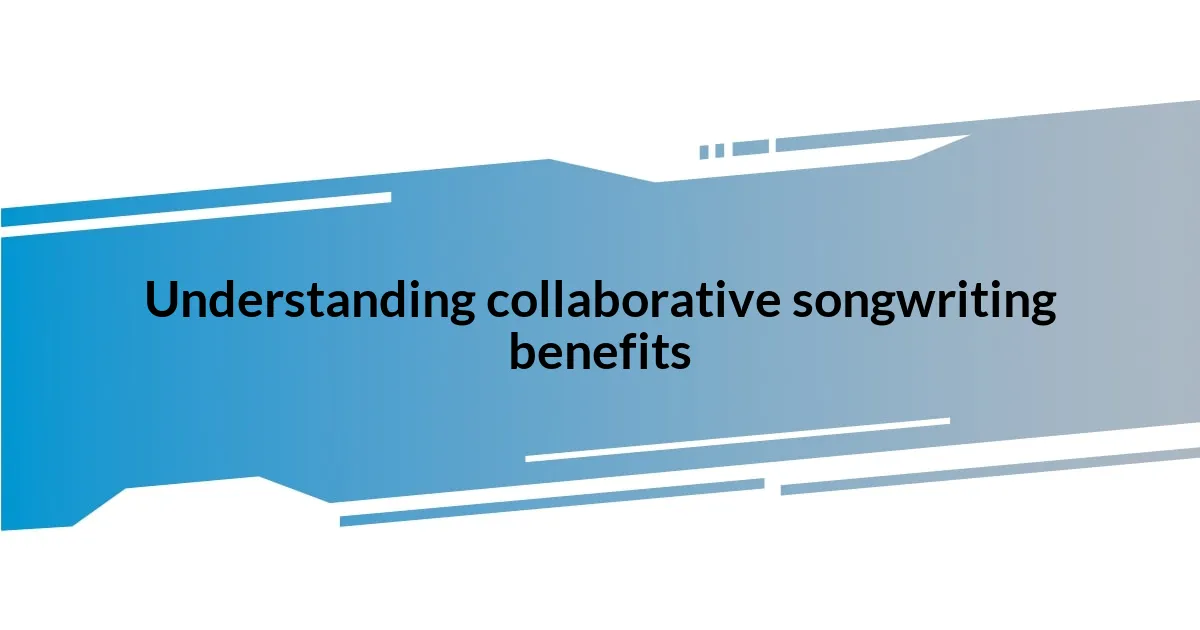
Understanding collaborative songwriting benefits
Collaborative songwriting is like weaving a tapestry; each contributor adds their thread, creating a richer, more vibrant piece. I remember a session where my co-writer suggested a melody I would’ve never come up with. It changed the entire mood of the song, reminding me how fresh perspectives can breathe new life into creative projects.
One of the most exhilarating benefits of collaborating is the instant feedback you get. I’ve often found that bouncing ideas off others not only clarifies my own thoughts but also opens up pathways I hadn’t considered. Do you ever find that sharing your ideas instantly enhances them? It’s strange how a simple conversation can morph a modest lyric into something profound and relatable.
Moreover, collaborating helps to hone one’s adaptability and communication skills. In one of my favorite songwriting experiences, our group faced differing opinions on a chorus. After some back-and-forth, we created a chorus that contained bits of everyone’s ideas – a true collective masterpiece. I often wonder, isn’t that the beauty of teamwork? Through collaboration, not only do we grow as songwriters but we also forge connections that enhance our musical journeys.
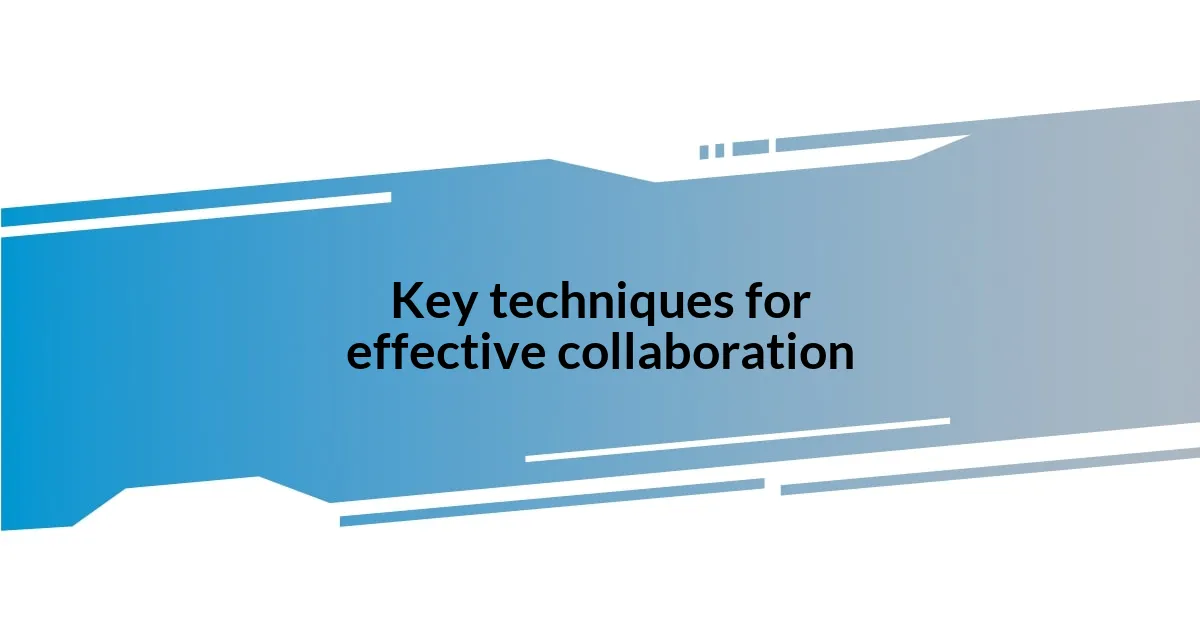
Key techniques for effective collaboration
Collaborative songwriting thrives on clear communication. I once worked with a group where we started each session by sharing our individual ideas and feelings about the song. This practice allowed us to build a song that truly represented all our voices. Have you ever felt a surge of creativity when everyone is on the same page? It can really amp up the songwriting process and deepen connections.
Another effective technique is establishing roles within the group. Each member might take on a specific responsibility—one can focus on the melody, while another shapes the lyrics. In one of my sessions, we divided tasks based on our strengths, which streamlined our workflow and led to a faster, more productive session. It felt incredible to see how owning our different roles elevated the collaborative process. Wouldn’t you agree that harnessing our individual skills can create something magical together?
Lastly, embracing flexibility can lead to remarkable breakthroughs. I remember a time when a co-writer suggested a completely different genre for a song we were working on. At first, I hesitated, but giving it a try opened up exciting possibilities. When we embrace change rather than resist it, we invite innovation into our collaboration. How has unexpected change shaped your creative partnerships in the past?
| Technique | Description |
|---|---|
| Clear Communication | Sharing ideas and emotions to ensure everyone’s voice is heard. |
| Defined Roles | Assigning specific tasks based on individual strengths to streamline the process. |
| Flexibility | Being open to new ideas and changes to encourage innovation. |
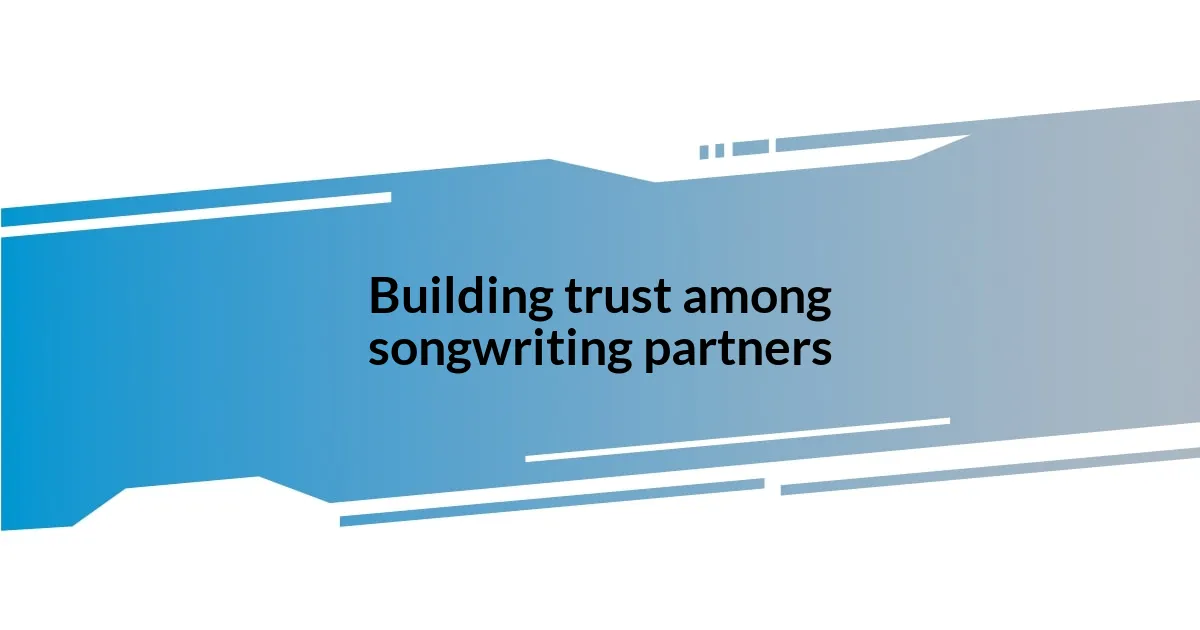
Building trust among songwriting partners
Building trust in songwriting partnerships is essential for creativity to flourish. In my experience, sharing personal stories can lay a powerful foundation for trust. I recall writing with someone who opened up about their struggles; it transformed our collaboration. Suddenly, our lyrics felt deeper, richer, as we tapped into those authentic emotions. When we share vulnerabilities, it enhances the bond and encourages a safe space for creativity.
- Prioritize open dialogue: Regularly discuss both song ideas and personal experiences.
- Celebrate achievements: Acknowledge each other’s contributions, fostering a supportive environment.
- Create a safe space: Encourage honesty and constructive feedback without judgment.
Trust often flourishes through small, consistent actions. I once worked with a partner who always took the time to check in before our sessions. That simple act made me feel valued and respected. It’s those little gestures that accumulate into a solid trust bank, allowing us to take creative risks together. Just imagine how liberating it feels to write without the fear of judgment!
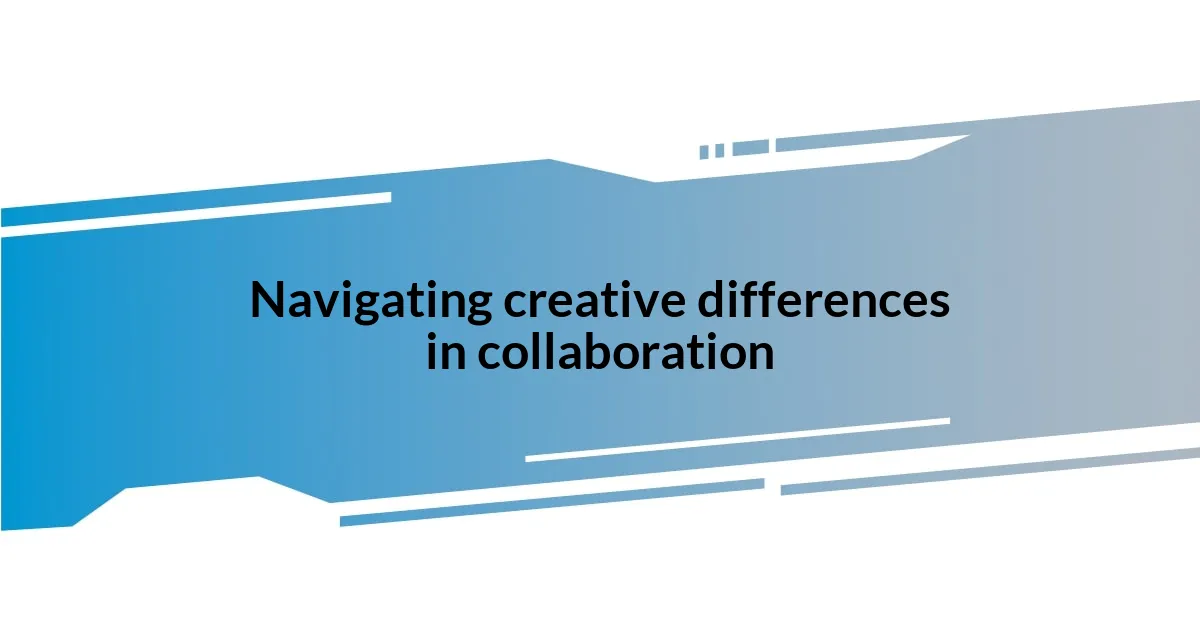
Navigating creative differences in collaboration
Creative differences can sometimes feel like stumbling blocks in collaboration, but I’ve learned they can also spark incredible creativity. I once teamed up with a writer whose musical influences were completely different from mine. Instead of clashing, our contrasting styles led to some of the most innovative ideas we’ve ever produced. How often have you experienced a shift in perspective that ignited new inspiration?
When navigating these differences, I prioritize active listening. In a recent session, I found myself caught off guard by a partner’s unexpected lyric choice. Rather than dismissing it, I took a moment to absorb their perspective. That simple act of openness encouraged further exploration, resulting in a beautiful fusion of our ideas. Have you noticed how listening can often reveal hidden gems?
It’s crucial to remind each other that differing opinions aren’t a threat but rather an opportunity for growth. In my experience, holding space for every voice allows room for experimentation. During a challenging writing session, I prompted my co-writer to share their vision openly, knowing it might challenge my own. The back-and-forth sparked a deep dialogue, and what emerged was a collaboration that felt truly authentic. Isn’t it fascinating how embracing differences can transform our creative partnerships?
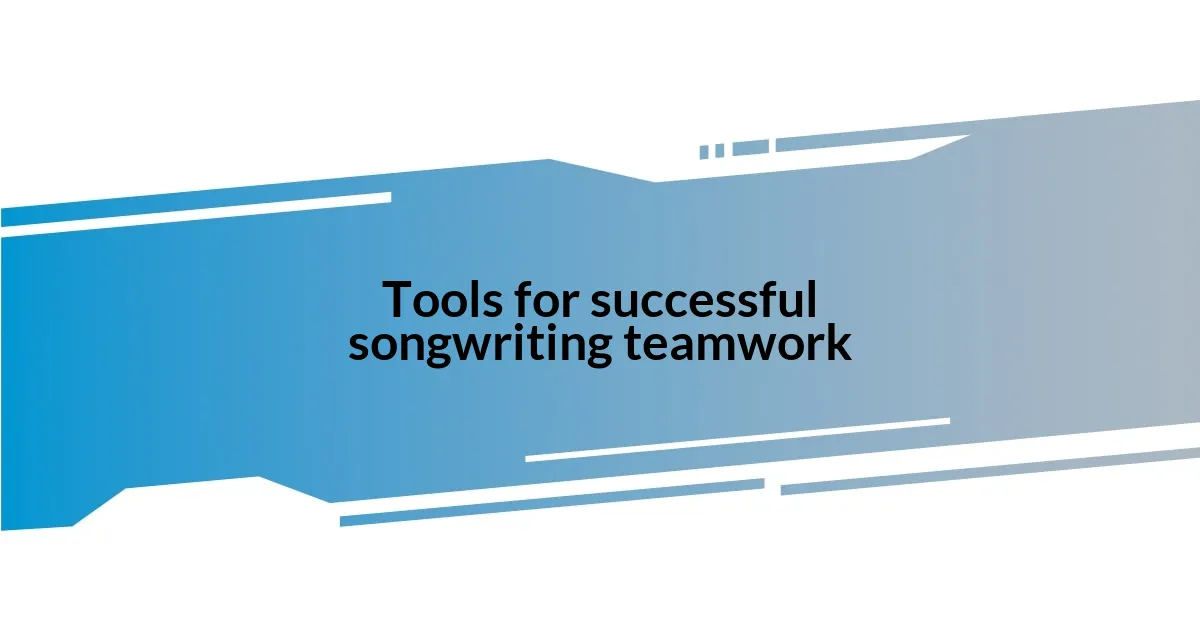
Tools for successful songwriting teamwork
When it comes to successful songwriting teamwork, having the right tools can make all the difference. I remember the first time I used a collaborative app like Google Docs during a writing session. Suddenly, we could both contribute in real-time, adding lyrics and making edits as ideas flowed. This seamless interaction not only enhanced our efficiency but also made us feel more connected, almost like we were jamming together, even if we were miles apart. How many times have you found yourself losing track of a brilliant idea because you couldn’t keep up with your collaborator?
Additionally, utilizing specialized software like Soundtrap or BandLab can help bridge creative gaps. These platforms allow multiple users to work on audio tracks simultaneously. I vividly recall using Soundtrap for a project with a friend. We layered our vocals and instrumentation while bouncing ideas back and forth, which brought a dynamic energy to our creative process. It was truly exciting to feel like we were in a virtual studio, crafting something together. Have you ever felt that rush when you nail a chord progression or melody as a team?
Finally, maintaining open lines of communication through tools like Slack or Trello keeps everyone on the same page. I’ve found that having designated channels for song ideas or feedback is incredibly beneficial. In one instance, we used Trello to track our song’s progress and discuss changes, which minimized misunderstandings. This structured approach encouraged a collaborative spirit, and it felt like we were navigating our creative journey together rather than flying blind. How much more could you achieve if every thought and idea was easily accessible to your songwriting partners?
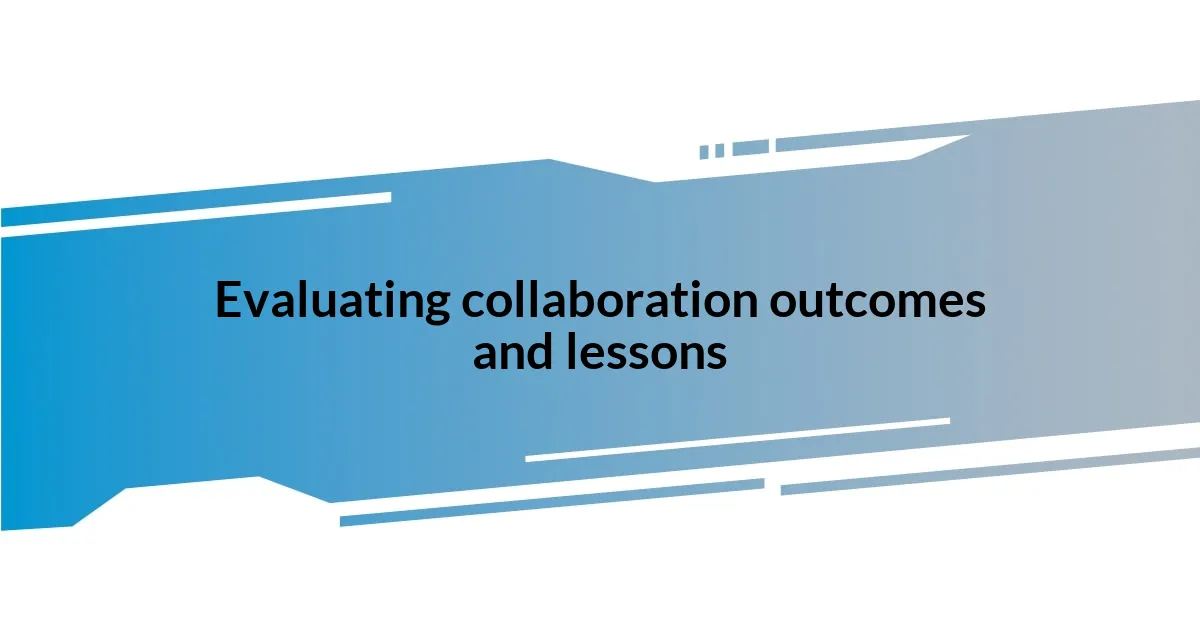
Evaluating collaboration outcomes and lessons
Evaluating the outcomes of a collaborative songwriting experience can be an eye-opening journey. After completing a project with a diverse group of musicians, we held a debriefing session where we shared what worked and what didn’t. Surprisingly, some of our biggest struggles led to breakthroughs that none of us expected. Have you ever reflected on how challenges can shape the outcome of your creative endeavors?
I distinctly remember a time when our song’s chorus felt lackluster during production. We decided to pause and discuss why it wasn’t hitting the mark. This candid conversation revealed that we were all holding back our true feelings about the direction. Once we addressed it, the energy shifted, and we collaborated on a powerful new motif that set the entire track on fire. Isn’t it amazing how honest dialogue can elevate a project?
In the end, I believe that analyzing our collaborative experiences teaches us valuable lessons about teamwork and trust. For instance, I’ve noted how vulnerability can foster deeper connections and boost creativity. Each session leaves its imprint, encouraging me to approach future collaborations with a renewed perspective. What lessons have your own collaborations taught you about working harmoniously with others?